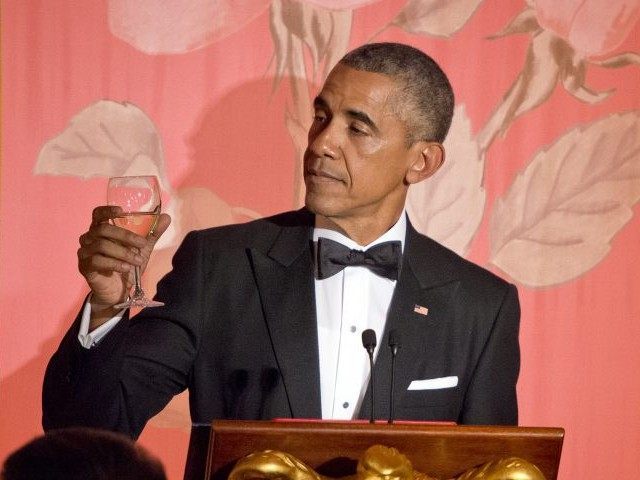President Barack Obama admitted that high unemployment during his tenure is allowing U.S. companies to impose lower wages on Americans.
Companies “can say to themselves… ‘If we do hire more workers, we’ll tell them, “This is how much we can afford, and if you want more, then we know that there’s a bunch of other people that we can get.”’” he told Kai Ryssdal, the host of Marketplace, a radio show on business issues. But neither Obama, nor the radio host, admitted that Obama’s pro-immigration policies are causing the problem he is complaining about.
Instead, Obama argued that his big-government policies can be solved by even bigger government.
In just 2013, for example, his pro-immigration and pro-amnesty policies — combined with the 1965 immigration law — added roughly 2.1 million foreign workers to the economy, even as 4.4 million American 18-year-old Americans began looking for jobs. During that year, wages flatlined, joblessness rose, company profits spiked and the Stock Market boomed.
When considered over the long term, Obama and the 1965 immigration-expansion law delivered 3 million extra workers into the 2013 labor-market, to compete against the 3.5 million 18-year-old children of Americans born in 1968.
Unsurprisingly, U.S. wages have been flat since the 2000, amid a record inflow of foreign workers that has annually added more than one foreign worker for every four Americans who turn 18.
But the flooded labor market is just fine for Obama and his fellow progressives. That’s because he thinks the resulting wage-freeze can be fixed by an even bigger dose of his progressive policies. Those political policies seek to replace the free-market with a corporatist regime or enforced cooperation — and inevitably, crony deals — between corporations and the Democratic-run federal government.
“The way to reverse [wage-decline] that is to invest in education, invest in things like infrastructure that can’t be exported, train our workers so that they continue to be the best in the world, make sure we’re investing in research and development so that we can continue to innovate,” Obama said Oct. 6 in the interview.
Far-reaching government regulation of trade can also help, he said. “Part of that is also making sure that we have access to markets and a reciprocal system of trade so that, since these folks are all selling to us, we better be darn sure that we’re selling to them,” Obama, as he made a pitch for his unpopular, 12-nation, Trans-Pacific Partnership free-trade treaty.
The pending treaty, in fact, will increase government power over the economy because it gives governments more political and legal authority to adjust international trade to favor or hurt multinational companies. For example, the treaty creates a multinational trade regulatory authority that allows continuous changes to the treaty, and also allows the U.S. government to raise or reduce the inflow of foreign workers into the U.S. economy.
That enormous power can be used to force companies to cooperate with the White House’s domestic political priorities, such as the increased immigration of low-skilled, government-dependent, Democratic-voting, wage-cutting migrants.
In his interview, Obama laid out a series of economic regulations — such as higher minimum wages and greater unionization — that he’d like to impose on a corporatist economy to offset the wages-cuts that he is encouraging by massive immigration.
“Raising the minimum wage makes a difference for millions of workers, making sure that we have a tax code that doesn’t incentivize short-term thinking on the part of companies and quarterly reports but instead gives them incentive to invest in their workers and make sure that they’re being treated fairly — that makes a difference,” he said.
“Making sure that we’re investing in the continuing education and training of our workers, so that they have more skills and that means that they can get higher wages. That makes a difference. Making sure that we have the laws that allow collective bargaining and unions. That makes a difference.”
“We have to make sure that the middle class and workers have more [political, not economic] leverage and the laws that we set up in this country can make a difference,” he said.
Obama also praised Germany’s economy, but gave credit to its European-style, partway-corporatist regulations, not to Germany’s industrious and clever workforce. “Here’s what we know. There are countries like Germany where wages typically are higher but they’re still competitive, and it has to do with the [regulatory] arrangements they make and how big of the pie that’s growing goes to middle-class families and workers as opposed to just shareholders and financial firms,” he said.
In his 2006 autobiography, Obama admitted that immigration hurts lower-skilled Americans, especially African-Americans.
“The number of immigrants added to the labor force every year is of a magnitude not seen in this country for over a century,” Obama wrote in “The Audacity of Hope,” his autobiography. “If this huge influx of mostly low-skill workers provides some benefits to the economy as a whole… it also threatens to depress further the wages of blue-collar Americans and put strains on an already overburdened safety net,” he acknowledged.
But those problems will be overcome once immigrants vote Democratic and help progressives fundamentally transform uncooperative America into Germany-on-the-Mississippi, he argues. “In my mind, at least,” Obama wrote, “the fates of black and brown were to be perpetually intertwined, the cornerstone of a [political] coalition that could help America live up to its promise.”

COMMENTS
Please let us know if you're having issues with commenting.